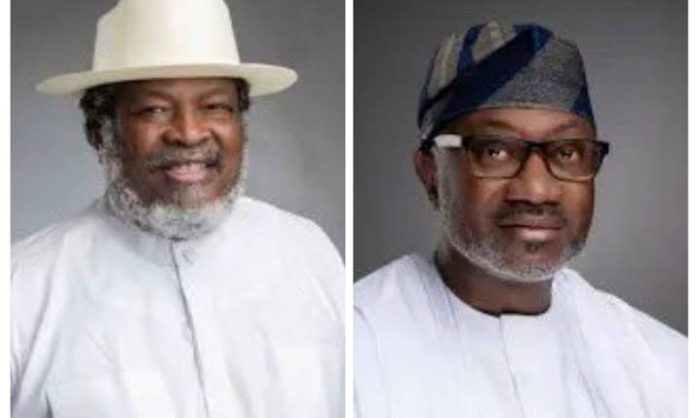Chairman of General Hydrocarbons Limited [GHL], Prince Nduka Obaigbena, has written to the Governor of Central Bank of Nigeria [FBN], Mr Yemi Cardoso, explaining the details in disagreement between GHL and FBN as well as highlighting facts of the transaction or deal, and proceeds to put into perspective of mischief or misgivings in the deal:
7th of November 2024
Mr Yemi Cardoso
Governor, Central Bank of Nigeria Central Business District, Abuja, FCT.
Your Excellency,
We write to you with all sense of responsibility and bring to your esteemed presence a matter of great importance involving First Bank of Nigeria Limited (FBN) and General Hydrocarbons Limited (GHL)
Relevant Context:
1.In 2020, Mr Oba Otudeko, then Chairman of FBN Holdings Plc approached me to assist with an introduction to the Nigerian National Petroleum Corporation (NNPC) GMD, Mr Mele Kyari, (he said he had seen us together in the media). His problem was that the NNPC under the late Maikanti Baru then GMD, NNPC had refused to sign the security documents for the now bad, non-performing loan to Atlantic Energy Drilling Concept Nigeria Limited (Atlantic Energy) for OML 26, OML 42, OML 30 and OML 34 under separate Strategic Alliance Agreements between Atlantic Energy and NPDC Limited, claiming it was a fraudulent scheme to defraud the Federal Government by the then Minister of Petroleum Resources, Diezani Allison- Madueke.
2. I facilitated the meeting where Mr Mele Kyari, GMD of NNPC told Mr Otudeko that there was nothing he could do given that the assets had been re-assigned to other parties led by the NNPC owned Nigerian Petroleum Development Company (NPDC) Limited.
3. During the discussions where I was present, it was clear that the loans given by FBN to Atlantic Energy did not follow due process and FBN was now faced with an unsecured and non-performing exposure of $718M and was on the verge of becoming a systemic risk to the banking sector.
4. It was discovered that FBN had given this loan recklessly without security as part of a scheme that funded Diezani Allison-Madueke and Kola Aluko, (details of these are still being investigated by Nigeria’s Economic and Financial Crimes Commission “EFCC” and the United Kingdom’s National Crime Agency “NCA”).
The Facts:
5. Mr Oba Otudeko sought my assistance to get FBN out of a potentially catastrophic situation and we agreed that since I had an approved Oil Mining Lease (OML) from the then President Umaru Yar’adua (under Section 2 of the Nigerian Petroleum Act 1969 as amended in 2004), we should work together. The OML licence was then ratified by President Muhammadu Buhari as President and Commander in Chief and Minister of Petroleum Resources, resulting in OMLs 120 and 121 being granted to General Hydrocarbons Limited on the 7th of April 2021 by the Department of Petroleum Resources (now renamed the Nigerian Upstream Petroleum Regulatory Commission “NUPRC”). GHL promptly paid the required Signature Bonuses to the Federal Government, to conclude the award.
6. After several meetings between GHL and FBN led by Mr. Otudeko, Mrs Ibukun Awosika (then Chairperson of FBN) and Mr. Adesola Adeduntan (then MD/CEO of FBN) and other Directors, it was agreed that since I had a valid OML award and they had finance, they would finance the optimum exploration, development and production of OML 120 and share the profit 50-50 with GHL over eight (8) years to help reduce the holes in their books caused by their non-performing loans (NPLs), specifically their toxic Atlantic Energy loan. However, we made it clear that we are not Atlantic Energy and would never assume their obligations which was then being pursued by AMCON and EFCC and our central role was to assist FBN return to good standing with a totally different transaction structure as GHL has no nexus with Atlantic Energy.
7. FBN then went to AMCON to sell their outstanding exposure as an Eligible Bank Asset (EBA) which was discounted and to be paid off by fifty percent profit from FBN’s financing of the optimum exploration, development and production of OML 120 over eight (8) years and FBN agreed to a claw back provision with AMCON that if the Outstanding Exposure was not paid, AMCON will claw back the EBA from the books of FBN.
8. To this end, parties (GHL and FBN) then signed a Memorandum of Understanding (MOU) which was agreed would be a legally binding agreement, for FBN to finance the optimum exploration, production and development of OML 120 and share profits with GHL after deduction of statutory taxes and expenses, to pay back the EBA to AMCON. Essentially, FBN had an ailment caused by Atlantic Energy, AMCON was the Doctor treating FBN’s ailment through its EBA and GHL’s medicine was to cure FBN’s ailment.
9. FBN and AMCON then signed a Loan Purchase and Limited Servicing Agreement (LPLSA) between themselves after which FBN, AMCON and GHL now signed an Outstanding Exposure Tripartite Deed (the Tripartite Deed) which allowed GHL to guarantee payment of a now discounted outstanding exposure on the books of FBN of $600M (Six Hundred Million Dollars) in Naira, in exchange for financing the optimum exploration, development and production of OML 120 by FBN.
10. Once GHL signed the Outstanding Exposure Tripartite Deed effective 31st December 2021, FBN’s account which was then classified by the Central Bank of Nigeria (CBN) was now whole again having escaped a loan loss provision of 302Bn Naira against a profit of 151Bn Naira ultimately declared for the year ending 31st December 2021. Had GHL not signed and guaranteed the EBA to AMCON, FBN’s loss for 2021 would have been 161Bn Naira, a whopping amount for the financial sector at that time, when the exchange rate was N400 – $1 having regard to the fact that this loan had been classified and non performing since 2015 (six years before). Having saved them this massive hit, FBN’s books now became performing, avoiding a market punishment and loss of confidence that would have followed their loss which they may never have recovered from as a result of their own reckless lending.
11. At GHL, we are wondering if FBN used us to get to profitability under false pretences knowing that they had no intention of meeting their financial obligations to GHL of fully funding the optimum exploration, development and production of OML 120 as events would later show, some of which we will now itemise below:
11.1 Once FBN had gotten its way, it started putting stumbling blocks in the financing of the development of OML 120 in clear breach of clause 5 of the Outstanding Exposure Tripartite Deed which stipulates as follows:
5. Funding Commitment
5.1 The parties to this deed agree that:
5.1.1 The bank shall where the Primary Obligor has satisfied all conditions precedent to disbursement under the Facility Agreement, disburse all of or part of the facility amount to the Primary Obligor, no later than five (5) business days after the Primary Obligor makes a utilisation request in accordance with the terms of the Facility Agreement.
5.1.2 The terms of the mandate letter shall apply, if the bank fails to disburse all or part of the facility amount to the Primary Obligor as stated in clause 5.1.1 above and fails to provide satisfactory reasons to the Corporation justifying the bank’s failure to disburse the facility amount or any part thereof to the Primary Obligor, where the Primary Obligor has satisfied all conditions precedent for the disbursement of the facility amount or any part thereof in accordance with the terms of the Facility Agreement.
11.2 FBN had signed a Mandate letter dated 28 March 2022 authorising the CBN to deduct the sum of $110M or any part thereof from FBN’s Operating Account with the CBN where FBN fails to advance the facility amount or any part thereof to GHL after the expiration of five (5) business days after GHL makes a utilisation request in accordance with the Facility Agreement. 11.3 Over seventy of such utilisation requests made by GHL took FBN between seven (7) days and sixty-seven (67) days to pay, (instead of five days) resulting in huge losses to GHL (please see attached itemised evidence). Vendors that were supposed to be paid simultaneously for a drilling campaign received staggered payments at different times resulting in the loss of 217 (two hundred and seventeen) man days and $47M (Forty- Seven Million Dollars) to GHL due to FBN’s failure to meet these obligations to make payment within five (5) days.
11.4 It is noteworthy that all payments by First Bank were to 3rd party
contractors and service providers whom they had pre-approved.
11.5 Indeed, at some point, GHL almost had an unfortunate incident on the rig with the lives of 100 souls on board without food or water due to FBN delays in disbursements, resulting in an international incident such that Shell and Mobil had to come to GHL’s rescue in the deep sea, saving the Country from international infamy.
11.6 FBN’s reluctance to pay as at when due started soon after consultants appointed and working for FBN and AMCON started making demands of GHL for “fees” not connected with the transaction. Indeed, GHL told the consultants that this would amount to bribery and corruption (we have evidence).
11.7 Later, GHL wrote a formal complaint to the then Managing Director of FBN and then Managing Director of AMCON (see attached). AMCON informed GHL that they would escalate the complaint to the CBN but till date we are yet to get any feedback from AMCON or CBN.
11.8 FBN later convened a meeting in September 2022 in Cairo, Egypt during their scheduled Board retreat. It was agreed at the sidelines of the retreat by FBN’s directors that GHL needed another $47M – $50M to complete the drilling campaign, get Competent Persons Report (CPR) for the Ewo field (where GHL made a P50 discovery, to industry acclaim, of 300M barrels of crude oil), and then proceed to do the OYO 8 workover. It is noteworthy that the Ewo discovery is what makes the entire transaction viable such that it will pay-off existing debts and AMCON’S EBA.
11.9 FBN became very tardy in disbursing after GHL failed to pay its “consultants” and did not disburse the $25M out of the agreed $50M until three to four months later, in January/February 2024, causing more losses to GHL’s drilling operations as we were liable for over $500,000 per day for the Blackford Dolphin rig which was on standby mode (not operating) during the period of non-payment.
11.10 Furthermore, Afreximbank also offered some support financing to GHL but FBN failed to acknowledge or respond to Afreximbank’s Term Sheet and letter (see attached), seeking to share the security pari passu and a confirmation of the loan repayment plan as stated in its Term Sheet (subject to Afreximbank’s Board approval), which had been forwarded to FBN for review and approval. FBN’s failure to respond killed the offer.
12. Since FBN got its way and avoided the 160Bn Naira loss following GHL’s signing of the Outstanding Exposure Tripartite Deed and with its account now performing, FBN
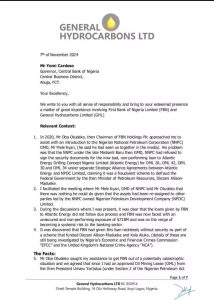
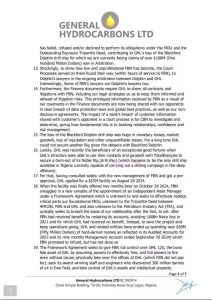
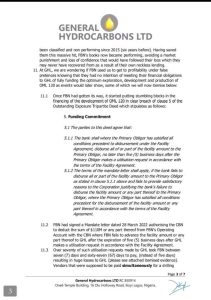
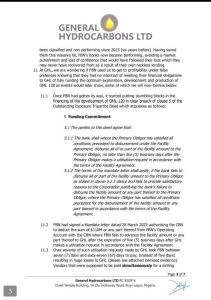
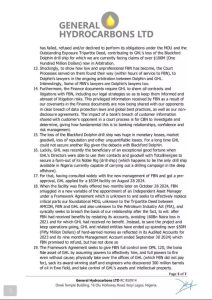
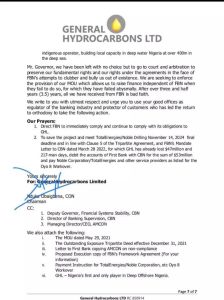 o
o
Share your story or advertise with us: Whatsapp: +2347068606071 Email: info@newspotng.com

